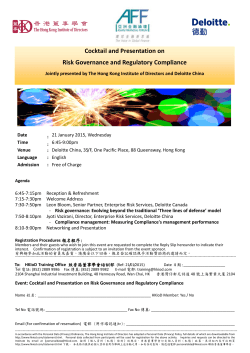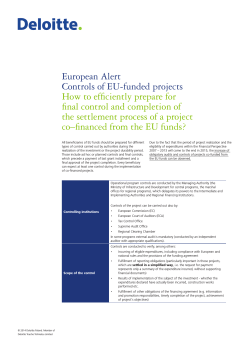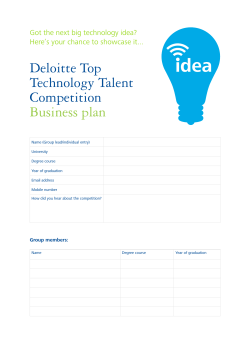
8671204 Building a world-class ethics and compliance program Article
Building world-class ethics and compliance programs: Making a good program great The U.S. Federal Sentencing Guidelines and, more recently, promulgations by the Organisation for Economic Co-operation and Development (OECD) Good Practice Guidance, have called for organizations to develop effective compliance risk mitigation programs and internal safeguards to protect against internal and external threats of corruption and fraud. Despite decades of experience in developing such practices, the results appear to remain uneven at best, which is especially concerning at a time when risks are increasing. Today, the stunning growth of social media, mobile technologies, and “big data” has ushered in a new era of transparency, exposing illegal transactions and raising profound new ethical questions in the way business is conducted. While ethics and compliance executives have come a long way in developing sophisticated measures to prevent, detect, and mitigate risk of malfeasance in their organizations, so, too, have those who wish to violate the rule of law and gain unfair advantage. “Good enough” today just is not good enough. Organizations should continuously strive for “great” in their ethics and compliance program. “Good enough” today just is not good enough. Organizations should continuously strive for “great” in their ethics and compliance program. What separates a “good” ethics and compliance program from a “great” one? How does an organization’s investment in compliance and reputational risk mitigation systems and processes measure up against leading practices? At a time when risks are increasing, what are the building blocks upon which to build a world-class program that not only protects an organization from internal and external threats, but also enhances its brand and strengthens its relationships with all stakeholders? While there are a number of factors that separate the “good” from the “great,” in our experience, here are five factors that are key differentiators in the highest performing compliance programs. Tone at the top — The starting point for any world-class ethics and compliance program is the board and senior management, and the sense of responsibility they share to protect the shareholders’ reputational and financial assets. The board and senior management should do more than pay “lip service” to ethics and compliance. The ethics and compliance culture must permeate throughout the entire organization, without exception, and should evidence itself through balanced performance metrics considered in the performance measurement of senior management. The board and senior management should empower and properly resource those individuals who have day-to-day responsibilities to mitigate risks and build organizational trust. The entire organization is accountable. Words without actions are an empty chalice. Corporate culture — Among some of the most essential elements of a “great” program is building a culture of integrity, and that is derived from the tone at the top. Culture, by far, tends to be one of the single biggest determinants of behavior in many organizations. As a leading corporate director once said, “In the fight between culture and compliance, culture will always win.”1 Culture is comprised of the underlying values, beliefs, attitudes, and expectations 1 2 Paula Reynolds, speaking at the Ethics & Compliance Officer Association's annual conference, Bellevue WA, September 2011. shared by an organization, and against which decisions are made and behaviors are formed. For this reason, a culture of integrity is central to any effective ethics and compliance program. If an organization is not managing culture, you can be sure of only one thing – that culture is managing the organization. Importantly, ethics and compliance programs that do not clearly contribute to a culture of ethical and compliant behavior may be viewed as perfunctory functions instilling controls that are impediments to driving the “value change” of the enterprise. If and when that happens, they can become nothing more than roadblocks to be circumvented. Risk assessments — The velocity of change in today’s world is accelerating, and with it an ever-changing risk landscape, with old risks remaining important and new risks appearing on the scene. Ethics and compliance risk assessments are not just about process, but also about the results and a deep understanding of the risks that an organization faces. The risk assessment focuses the board and senior management on significant risks and the highest risk concentration within the organization, and provides the basis for honest consideration of the actions necessary to avoid, mitigate, or remediate those risks. It provides a critical tool for the allocation of scarce resources. Re-assessing these risks on a continuous basis is required in a transparent world that is constantly exposing new risks. basis. In the spirit of ongoing testing and monitoring, it is also crucial to perform periodic cultural assessments and reinforce the desired behaviors while remediating the negative ones. The chief ethics and compliance officer — The chief ethics and compliance officer has day-to-day responsibility for overseeing the management of compliance and reputational risks, and is the agent for the board’s fiduciary obligations to provide oversight and accountability of such. It requires someone with an uncommon breadth of experiences who can design the necessary risk architecture, assess business and cultural risks across a variety of businesses and geographies, develop training and communication strategies, build comprehensive databases, and assess data analytics, while conducting sometimes critical investigations. It requires someone who can take a balanced approach to ethics and compliance, and who by his or her nature can build partnerships with business leaders that enhance levels of trust both internally and externally with all stakeholders. A skilled chief ethics and compliance officer can create a competitive edge for their organization. Such individuals are not always easy to find, and appropriate training and coaching can benefit both the individual and the organization. In this fast-paced ever-changing world, now is the time to transform your “good” ethics and compliance program into a “great” ethics and compliance program. Testing and monitoring — Critical to the success of any organization’s efforts in managing risk is a robust testing and monitoring program to help assure the control environment is effective. All the policies, practices, and procedures developed to manage risk are irrelevant if they are poorly understood and executed and, as a result, do not change the behavior of the organization. It begins with implementing appropriate controls, which should be tested and ultimately monitored and audited on a regular 3 Contacts Please contact one of our Enterprise Compliance Services leaders to discuss your organization’s ethics and compliance issues. Nicole Sandford Partner, National Practice Leader, Governance and Enterprise Compliance Services Deloitte & Touche LLP +1 203 708 4845 nsandford@deloitte.com Stamford, CT Keith Darcy Independent Senior Advisor Deloitte & Touche LLP +1 203 905 2856 kdarcy@deloitte.com Stamford, CT Maureen Mohlenkamp Principal Deloitte LLP +1 212 436 2199 mmohlenkamp@deloitte.com Wilton, CT Additionally, feel free to reach out to our team of former compliance officers who are located across the country and are experienced in a wide variety of industries. Rob Biskup Director, Deloitte Forensic Deloitte Financial Advisory Services LLP +1 313 396 3310 rbiskup@deloitte.com Detroit, MI Industry: Consumer & Industrial Products Kevin Blakely Senior Advisor Deloitte & Touche LLP +1 201 630 5085 kblakely@deloitte.com Jersey City, NJ Industry: Financial Services Michael Hercz Director Deloitte & Touche LLP +1 714 913 1358 mhercz@deloitte.com Costa Mesa, CA Industry: Life Sciences Timothy Cercelle Director Deloitte & Touche LLP +1 216 589 5415 tcercelle@deloitte.com Cleveland, OH Industry: Insurance Eric Pillmore Senior Advisor, Center for Corporate Governance Deloitte LLP +1 704 227 7928 epillmore@deloitte.com Charlotte, NC Industry: All Maurice Crescenzi Senior Manager Deloitte & Touche LLP +1 646 522 8475 mcrescenzi@deloitte.com Parsippany, NJ Industry: Consumer Products and Life Sciences Michael Fay Principal Deloitte & Touche LLP +1 617 437 3697 mifay@deloitte.com Boston, MA Industry: Investment Management George Hanley Director Deloitte & Touche LLP +1 973 602 4928 ghanley@deloitte.com Parsippany, NJ Industry: Insurance Peter Reynolds Director Deloitte & Touche LLP +1 973 602 4111 pereynolds@deloitte.com Parsippany, NJ Industry: Banking & Securities Thomas Rollauer Executive Director, Deloitte Center for Regulatory Strategies Deloitte & Touche LLP +1 212 436 4802 trollauer@deloitte.com New York, NY Industry: Banking & Securities Seth Whitelaw Director Deloitte & Touche LLP +1 215 789 6396 swhitelaw@deloitte.com Philadelphia, PA Industry: Life Sciences About Deloitte Deloitte refers to one of more of Deloitte Touche Tohmatsu Limited, a UK private company limited by guarantee, and its network member firms, each of which is a legally separate and independent entity. Please see www.deloitte.com/about for a detailed description of the legal structure of Deloitte Touche Tohmatsu Limited and its member firms. Please see www.deloitte.com/us/about for a detailed description of the legal structure of Deloitte LLP and its subsidiaries. Certain services may not be available to attest clients under the rules and regulations of public accounting. This publication contains general information only and Deloitte is not, by means of this publication, rendering accounting, business, financial, investment, legal, tax, or other professional advice or services. This publication is not a substitute for such professional advice or services, nor should it be used as a basis for any decision or action that may affect your business. Before making any decision or taking any action that may affect your business, you should consult a qualified professional advisor. Deloitte shall not be responsible for any loss sustained by any person who relies on this document. Copyright © 2014 Deloitte Development LLC. All rights reserved. Member of Deloitte Touche Tohmatsu Limited
© Copyright 2025









